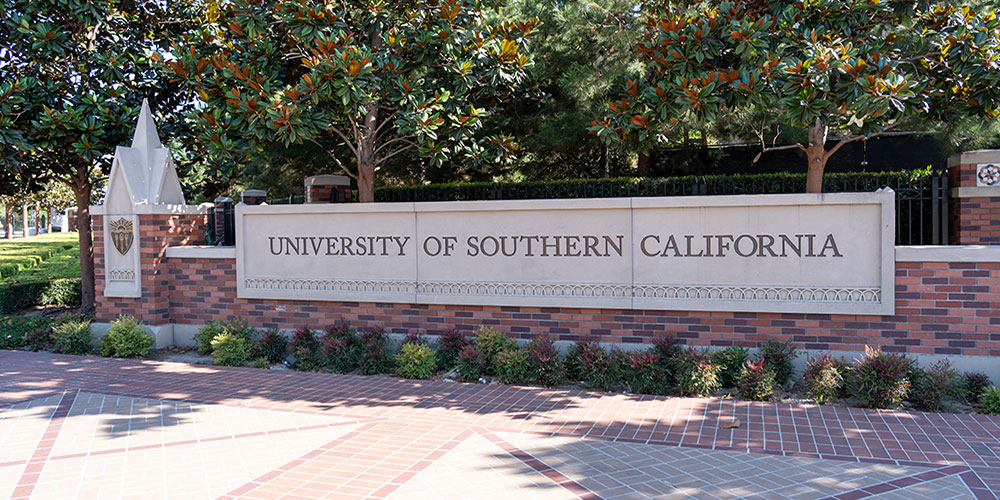LOS ANGELES — University of Southern California (USC) students returned to the classroom Monday where they were met with added security measures following on-campus Israel-Hamas war protests last spring.
Campus conflict began after officials announced on April 15 that USC would not allow its valedictorian to speak during the commencement ceremony. Asna Tabassum, who USC officials chose as valedictorian from nearly 100 student applicants, had expressed pro-Palestinian views, including some that led to accusations of antisemitism, Campus Safety previously reported.
The school cited safety concerns as the reason for canceling Tabassum’s speech. Hundreds of students marched through the USC campus on April 18 to protest the school’s decision.
RELATED: How Much Did Last Spring’s Protests and Encampments Cost UCLA?
Protesters later set up a pro-Palestinian encampment, dubbed the “Gaza Solidarity Occupation,” at USC’s Alumni Park on April 24. USC Department of Public Safety officers reportedly first visited the encampment and instructed demonstrators not to hang signs, flags, or other materials from trees and posts in the park. They also warned them not to use megaphones. The Los Angeles Police Department arrived at the protest around 4 p.m. and ordered the protesters to disperse around 5:30 p.m., according to CBS News.
Many demonstrators stayed in the area, locking arms as LAPD officers in riot gear approached. Some threw objects at officers, including water bottles and rocks. At least 93 people were arrested for trespassing, a misdemeanor offense, and booked at LAPD’s Metropolitan Division.
USC Implements Access Control Measures for Start of New Academic Year
As a result, USC officials established new security protocols this school year to minimize the impact of potential protests, including access control. All main gates are open around campus but students and staff must present their USC IDs to gain access. USC opened all pedestrian entrances on Aug. 15 and established new customer service tents, CBS reports.
USC says there is a “fast lane” available at most vehicle and pedestrian entrances for those with an ID. Cardholders can tap or swipe their card for faster campus access, according to ABC News. The McClintock and McCarthy entrances will be open 24 hours a day while vehicle entrances will be open weekdays from 6 a.m. – 8 p.m.
All campus guests must be registered online by their campus sponsor. Visitors should have their photo ID and visitor QR code provided by their campus sponsor. Walk-ups or unregistered guests will be asked to show their government-issued ID and the reason for their visit.
“Our goal is to make your USC campus experience as smooth as possible with the university’s modernized security measures,” the school wrote on its website. “When arriving, please plan ahead and allow for extra time to enter campus and have the necessary information ready for guest services.”
Following the dismantling of the encampment back in April, USC remained closed to the public the following day with only students, faculty, and employees with proper identification given access.
Columbia University Limits Access for New Academic Year
Similarly, New York’s Columbia University announced earlier this month it has indefinitely moved to “orange” status, only allowing students, staff, and pre-approved guests on campus, and placing limits on entrances and exits. Guests are allowed on campus but must go through a pre-registration process that university officials announced in June.
RELATED: Preparing for Presidential Campaigns and Protests on Campus
A Coliumbia spokesperson told Fox News that the school used the summer to “learn from the lessons of the past academic year and plan for the next one.”
“As part of a consultative process, we are looking at various ways to supplement our public safety capabilities,” said the spokesperson. “We seek to strengthen the department’s skills and training in de-escalation techniques, expanding the department’s ability to manage a range of incidents while taking into account the fact that Columbia does not have its own police force, as many peer institutions have, and potentially reducing our reliance on the NYPD.”
The Wall Street Journal reported the changes could include adding peace officers with arrest powers to the school’s public safety department.
UC System Bans Encampments, Masking, Blocking Paths
Ahead of the new school year, other California colleges have also enacted new policies in response to campus protests, Campus Safety reported. Chancellors at all ten University of California (UC) were directed by UC President Michael V. Drake to strictly enforce rules banning encampments, protests that block access to areas on campus, and masks that conceal identity.
“Freedom to express diverse viewpoints is fundamental to the mission of the University, and lawful protests play a pivotal role in that process,” Drake wrote in an Aug. 19 letter. “While the vast majority of protests held on our campuses are peaceful and nonviolent, some of the activities we saw this past year were not.”
Drake told chancellors that First Amendment rights and academic freedom must not “place community members in reasonable fear for their personal safety or infringe on their civil rights,” the Los Angeles Times reports.
American Association of University Professors (AAUP) Condemns New Campus Protest Policies
Other schools have revised their protest rules, including the University of Pennsylvania, Indiana University, the University of South Florida, and Harvard University.
On Aug. 14, the American Association of University Professors (AAUP) released a statement condemning measures restricting peaceful protests, saying the new policies are overly restrictive, undermine academic freedom, violate the First Amendment, and were developed without faculty input.
The full statement released by the group can be read here. The AAUP is a non-profit association of professors and other academics in the U.S. Its membership includes over 500 local campus chapters and 39 state organizations.







